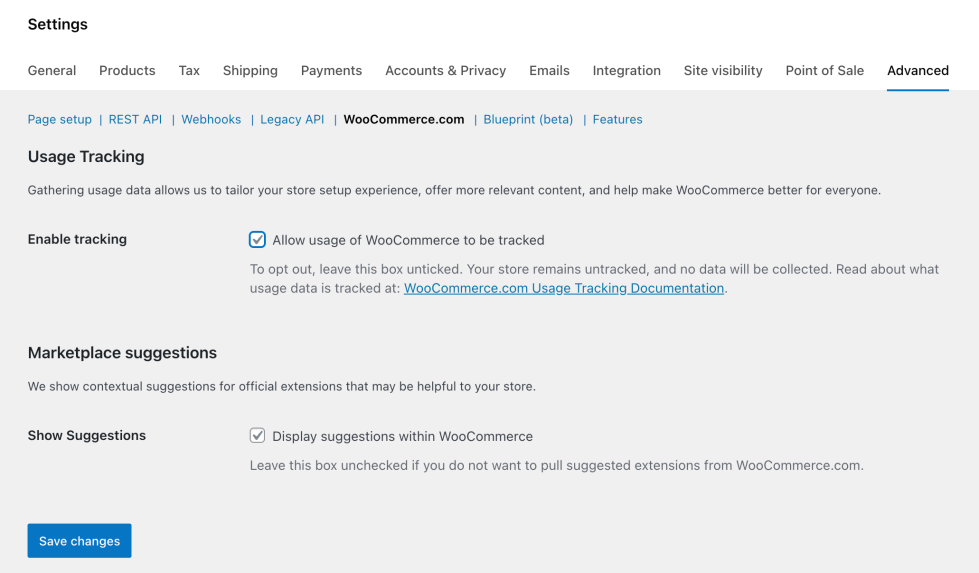At Woo, privacy and user control over data are paramount; our core WooCommerce plugin is built with these protections in mind.
We are committed to complying with the General Data Protection Regulation (GDPR), the California Consumer Privacy Act (CCPA), and other relevant privacy regulations to protect your information and ensure responsible data practices.
Usage tracking is turned off by default for stores using the core WooCommerce plugin downloaded from WordPress.org. This gives you complete control over whether or not to share data with us.
If you choose to enable usage tracking, the collected data will help us improve WooCommerce and develop features to support your business growth. You can change your preference anytime via your dashboard settings.
WordPress’s open-source nature prioritizes user autonomy, with complete data control for site owners and developers. WooCommerce follows these principles by not enabling usage tracking by default.
While this approach ensures user control, it results in a lack of clear insight into:
These factors can make improving our platform a challenge.
To help address this, we encourage store owners to enable usage tracking from within their WordPress admin (WP Admin) dashboard. Doing so sends us basic information about their store and how WooCommerce is set up and used.
Enabling usage tracking helps us:
By sharing this data, you’re helping us make WooCommerce better for everyone.
Once tracking is enabled, we collect data regarding how a store is set up and managed. We process this data because it is in our legitimate interests to provide services, improve our products, and support your business needs.
When you enable usage tracking, this data is sent automatically to our servers.
| What we may collect | How we use it |
|---|---|
| Basic store details: Store URL, admin email, and connection status to WooCommerce.com. | To manage accounts and provide critical updates or alerts. |
| Store setup and configuration: WordPress version, active theme, plugins, server environment (PHP, SQL), localization, payment gateways, cart/checkout setup, and mobile app usage. | To ensure compatibility, optimize performance, and tailor features to store needs. |
| Store usage metrics: Order counts, revenue per payment gateway, product/category counts, and review counts. | To better understand store performance, prioritize feature development, and improve order attribution. |
| User behavior within WooCommerce: Interaction with onboarding, product management, and settings. | To streamline workflows, simplify navigation, and improve merchant onboarding. |
| Extension-specific data: Configuration and usage of WooCommerce extensions (such as Stripe, WooCommerce Bookings, WooCommerce Subscriptions, etc.). | To ensure extensions function correctly, enhance their functionality, and notify users of any important updates. |
The items listed in the table above are examples of the types of data we collect and how we may use that data. It is not an exhaustive list of everything shared when usage tracking is enabled.
Once Jetpack is installed, we collect limited information about how your customers navigate store-related pages. This helps us prioritize features, identify areas for improvement, and enhance overall store usability.
| What we may collect | How we use it |
|---|---|
| Customer behavior: Actions on pages such as My account, product views, cart interactions, checkout steps, and order confirmations. | To refine key customer-facing features such as cart and checkout for improved usability and effectiveness. |
Learn more about WooCommerce information collected via Jetpack.
To opt into or out of data-sharing for analytics purposes: in your store’s WP Admin dashboard, navigate to WooCommerce > Settings > Advanced > WooCommerce.com and check or uncheck the Enable tracking checkbox.

To opt out of data-sharing: in your store’s WP Admin dashboard, navigate to WooCommerce > System Status > Tools and click the Reset button.

Occasionally, WooCommerce will make suggestions that may be appropriate for your store, including:
If you’d prefer not to receive these suggestions, you can disable them in your store’s WP Admin dashboard by going to WooCommerce > Settings > Advanced > WooCommerce.com and deselecting the Show Suggestions checkbox.
To disable WooCommerce usage tracking in Jetpack from your store’s WP Admin dashboard, navigate to Jetpack > Settings and turn off the WooCommerce Analytics module. You can learn more about managing Jetpack features.
If your store uses extensions that integrate with WooCommerce, they may send us additional data when you enable WooCommerce usage tracking.
For example, if you use WooCommerce Subscriptions, we may track:
This data is used to improve functionality and enhance your overall WooCommerce experience. No data is collected unless usage tracking is enabled.
Extensions that send extension-specific data to us when you enable WooCommerce usage tracking include:
For details on how our parent company, Automattic, handles data related to accounts created on WordPress.com or WooCommerce.com, please review its privacy policy